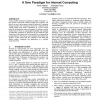Free Online Productivity Tools
i2Speak
i2Symbol
i2OCR
iTex2Img
iWeb2Print
iWeb2Shot
i2Type
iPdf2Split
iPdf2Merge
i2Bopomofo
i2Arabic
i2Style
i2Image
i2PDF
iLatex2Rtf
Sci2ools
121
click to vote
NSPW
2004
ACM
2004
ACM
Symmetric behavior-based trust: a new paradigm for internet computing
Current models of Internet Computing are highly asymmetric – a host protects itself from malicious mobile Java programs, but there is no way to get assurances about the behavior of a program running remotely. The asymmetry stems from a behavior-based security model: hosts ensure conformance to a given security policy by restricting the actions of programs. In contrast, security models that are based on cryptography (including code signing) are inherently symmetric by design but do not match the open architecture of the Internet and are unsuitable for reasoning about program behavior. We propose a new paradigm that combines the openness of the former with the symmetry of the latter and thereby enables completely new applications in a globally connected world.
Related Content
| Added | 30 Jun 2010 |
| Updated | 30 Jun 2010 |
| Type | Conference |
| Year | 2004 |
| Where | NSPW |
| Authors | Vivek Haldar, Michael Franz |
Comments (0)

